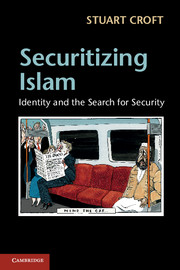Book contents
- Frontmatter
- Contents
- Figures
- Tables
- Acknowledgements
- Introduction
- 1 Ontological security and Britishness
- 2 A post-Copenhagen securitization theory
- 3 ‘Two World Wars and one World Cup’
- 4 ‘New Britishness’ and the ‘new terrorism’
- 5 The construction of ontological insecurity
- Conclusion
- Select bibliography
- Index
- References
3 - ‘Two World Wars and one World Cup’
constructing contemporary Britishness
Published online by Cambridge University Press: 05 June 2012
- Frontmatter
- Contents
- Figures
- Tables
- Acknowledgements
- Introduction
- 1 Ontological security and Britishness
- 2 A post-Copenhagen securitization theory
- 3 ‘Two World Wars and one World Cup’
- 4 ‘New Britishness’ and the ‘new terrorism’
- 5 The construction of ontological insecurity
- Conclusion
- Select bibliography
- Index
- References
Summary
Introduction
‘Two World Wars and One World Cup’ has been for many years the song of choice for England’s football supporters when the national team has played against Germany. It reflects the sense of twentieth-century triumph: in the Great War of 1914–18; in the Second World War; and in London in 1966, when England’s footballers defeated West Germany by four goals to two to win the football World Cup. In terms of football, of course, it is a rather hollow chant. England’s one World Cup triumph has been eclipsed by Germany’s three (and another three defeats in the Final match); Germany defeated England in the 1970 Tournament, which is where England lost the World Cup; in the only two other competitive semi-final matches that England has ever reached (World Cup 1990, European Championship 1996) they lost to Germany; indeed, after the 1966 Final, England did not defeat Germany again in a competitive match for thirty-four years. It is a song that harks back to ‘past glories’, evoking particular temporal moments.
This song, however, reflects a deeper truth about British identity, which is that it has been in many ways constructed around, and against, German identity. The central reason for that concerns the moment at which what we consider to be contemporary Britishness was founded: in the ongoing mythologizing about the Second World War. Hostility towards, competition with, discussion about Germany all help to cement that Britishness.
- Type
- Chapter
- Information
- Securitizing IslamIdentity and the Search for Security, pp. 110 - 158Publisher: Cambridge University PressPrint publication year: 2012



